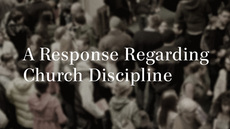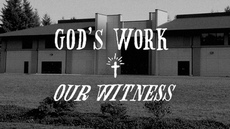In recent days, there has been some discussion surrounding Mars Hill Church and our process of church discipline. We do not wish to comment on the specific scenario in question, as this is a private matter between church leadership and members, all of whom have voluntarily agreed to this prior to becoming members. We do want to be as clear and forthright as possible in presenting our theology of repentance, forgiveness, and church discipline and make clear that our convictions on this come from our study of Scripture and our deep love for our members and a desire for them to enjoy the freedom that comes from walking by the Spirit in response to Christ’s work on the Cross on our behalf. At the heart of the process is our deep belief that church discipline is about the grace of God, not penance.
The following is from a chapter in Pastor Mark Driscoll’s book,
Vintage Church, entitled, “What is Church Discipline?” We offer this to give a full description of our theology and process for church discipline as possible.
Additionally, we encourage you to study more resources at Monergism.com from respected scholars and theologians on church discipline.
What is Church Discipline?
“Whoever loves discipline loves knowledge, but he who hates reproof is stupid.” Proverbs 12:1
I was an intern on staff at a large, multicultural, suburban church and will never forget the look of horror on the woman’s face. A seasoned pastor and I were standing in the back of the room during a Sunday service, and she was running out of the building leading her small children by the hand. Tears were flowing down her face, and she was visibly distraught.
The seasoned pastor motioned for me to follow him as he sped off to catch up with the woman. I stood quietly by, hoping to learn from his example, and I was not disappointed.
He kindly and calmly asked the woman to please share what was wrong so that he could lovingly serve her. Nearly hysterical, she explained that she was a Christian who had been attending the church for a while and was in the midst of a painful divorce. She said that her husband, a professing Christian, had been committing adultery with another woman who claimed to be a Christian. He had abandoned his wife and children, filed for divorce, and intended to marry the other woman he was living and sleeping with.
As she was sitting in the church service with their children, her husband to whom she was still legally married sat a few rows in front of her . . . with his adulterous girlfriend. Apparently not noticing his wife and children seated behind him, the man proceeded to enjoy the sermon, nodding his head and responding with the occasional “amen” while snuggling with his girlfriend and giving her the occasional romantic glance and kiss on the lips.
The man’s wife and young children were watching all of this transpire. Obviously confused, the young children began asking their mommy why Daddy was in the church with another woman.
As I listened to the woman’s story, my heart broke for her and the children, and I became furious with her husband. I watched the seasoned pastor to see how he would respond and was impressed. He asked the woman to point out her husband from the back of the room and proceeded to walk up to the man during the sermon, tap him on the shoulder, and motion for him and his girlfriend to follow him out of the auditorium.
They did and were mortified to see the man’s wife and children standing in the foyer, wailing uncontrollably. The pastor asked if the man was guilty of adultery and confirmed the facts of the story as told by his wife.
At first, the husband tried to explain himself, which only dug him a deeper grave with the seasoned pastor. Seeing that things were not going well, his girlfriend spoke up and attempted to defend their relationship. The pastor responded by quoting multiple Scriptures from memory about adultery and rebuked them both for saying they were Christians and living in unrepentant, gross sin.
The pastor kept his cool but was as firm and direct as I had ever seen anyone in such a tense situation. The pastor then asked the wife what she wanted. She said that she wanted her husband to repent of sin, end his adulterous relationship, and meet with her and a pastor to try to save their marriage. The pastor then told the man that he would meet with him and his wife to seek to reconcile their marriage and family, but if the man was unwilling, he was never to set foot in the church again. His reasoning was that although the wife and children had intended to leave the church, they should not have to because they were the victims of gross sin and needed the loving support of the church. On the other hand, the man and his whorish girlfriend would be welcome in the church only if they repented of their sin and lived as Christians. If they did not, they should be the ones to leave.
I do not know what transpired in that family. But I do know that pastoral ministry involves dealing with human sin in the midst of intense emotion. Furthermore, because church leaders love the reputation of Jesus, love the entire church in which they serve, and love the sinner, dealing with sin is an art form that takes great courage, discernment, and wisdom.
All of the individual and corporate shortcomings of God’s perfect intentions for creation, whether intentional or unintentional or through omission or commission, qualify as sin or the effects of sin. Satan committed the first sin. He led a rebellion against God. After Satan and demons were cast out of heaven, Satan tempted our first parents, Adam and Eve, to join his sinful rebellion against God. Adam was the representative and father of humankind, and when he sinned and fell out of favor with God , so did every person who would ever live.
Every person since Adam is a sinner , both by nature and choice . Everyone (except Jesus Christ) is, from conception, sinful by nature and corrupted to the very core of his or her being and therefore incapable of doing anything that pleases God. Thus everyone, except Jesus Christ , sins by breaking God’s holy laws , because they are sinners in their hearts . Therefore, the question is not whether people will sin against one another, but rather how they will deal with that sin. The following process should normally occur when a Christian sins.
Step 1: Conviction
God made us with a conscience to guide our decision making through life and to make us feel convicted when we do wrong. God the Holy Spirit shines the light of grace on our sin, exposing it for what it is, calling us and helping us move to repentance. This is the convicting work the Bible frequently speaks of . He often does his convicting work through other Christians who love us enough to ask about junk they see in our lives.
We naturally avoid conviction because it hurts to feel the pain of guilt and the shame of our sin. But working through conviction takes us to the motivations behind the behavior, the sinful desires of our flesh , and the corrupt passions that will continue to drive us until we identify them and put them to death . In Jesus we have been delivered from the Adamic heritage and the dominion of darkness so we are no longer under the authority of sin or the power of the devil. Romans 6:6 says, “We know that our old self [our membership in the family of Adam] was crucified with him in order that the body of sin might be brought to nothing, so that we would no longer be enslaved to sin.” Conviction is an essential step to exposing sin for what it is so we can be free from enslavement to sin.
Step 2: Confession
As the Holy Spirit convicts us of sin and renews our mind, we must then name our sin as God does and accept the truth that we have sinned. Confession means agreeing with God and telling the truth about who we are and what we have done. Confession includes naming our sin to Jesus and anyone else we have sinned against or is directly affected by our sin. James 5:16 teaches us it is best to confess the sin to faithful Christians who will pray for us and help us grow in holiness. We must do this without blaming anyone else for our sin, excusing it, minimizing it, or only partially confessing it. While conviction is a gift God gives to us, confession is our response, which then prepares us for a life of repentance, restitution, and reconciliation.
Step 3: Repentance
The heart of repentance is changing your mind about who is god in your life. When we sin, we are worshiping someone or something else as a false god and functional savior. In repentance we turn from those false gods back to the true and living God of the Bible, who alone loved us enough to die for our sin and freedom. This means that a deep change of values occurs, and we change our mind about what we deem important. Then there will be a heart-sourced change of behavior. We must learn to repent continually by turning our face to Jesus and turning our back on sin. Repentance is not trying to manage our sin, but rather putting it to death before it puts us to death. Colossians 3:5 says it perfectly: “Put to death therefore what is earthly in you: sexual immorality, impurity, passion, evil desire, and covetousness, which is idolatry.”
It is important to note that false repentance takes many forms, none of which can be accepted as true repentance. Some forms of false repentance are explained below.
Mere Confession
When God’s people confess their sins without truly repenting, they are agreeing that they are guilty of evil but are not living lives of repentant transformation. This is what often happens in the psychobabble churches where everyone glories in how broken they are but neglect to live out the Spirit’s power for new life.
Worldly Sorrow
In 2 Corinthians 7:10 we are told, “Worldly grief produces death.” This is because worldly sorrow feels bad for sin but does not understand that Jesus died for sin as our “man of sorrows ” and “carried our sorrows ” so that we can move from sorrow to salvation, forgiveness, new life, and joy marked by his salvation and not just our sin. People who exhibit mere worldly sorrow are left in the deadening hopelessness of their guilt and shame.
Self-Righteous Repentance
Proud, self-righteous repentance occurs when we confess the sins of other people while neglecting our own manifestations of depravity. It can also happen when people repent of “acceptable sins” to deflect attention from deeper sins. Perhaps the most legendary example of this is spoken of in Luke 18:9–14, where Jesus delineates between the false repentance of the self-righteous Pharisee who confesses the sins of others rather than his own, and the true repentance of the humble tax collector.
Religious Repentance
Religious repentance is the attempt to keep God happy or to get God to bless us. It is going through a ritual of confession but only to manipulate God to like us, not to work change in us. It is feeling sorry for getting caught in sin or feeling sorry for the consequences of sin, but not feeling sorry about the sin itself as a violation against God so severe that Jesus had to die for it.
This one may be the worst of all forms of false repentance. Religious repentance seeks in some way to pay God back by feeling really bad and wallowing in shame, guilt, and condemnation. It is void of the gospel truth that Jesus has taken our shame, guilt, and condemnation so that we are no longer under condemnation . Through the gospel we receive forgiveness, but in religious repentance we grossly seek to earn it by attempting to punish ourselves—often by denying ourselves the pleasure of gifts from God. Religious repentance falsely believes that if we do not punish ourselves for our sin, God will be angry and punish us. The gospel tells us that Jesus was already punished in our place for our sin and that God is just, so he will not demand further retribution by punishing us. Furthermore, religious repentance is rare because religious people believe their righteousness before God resides in their good works and not solely in the cross of Jesus. As a result, religious repentance is filled with pride whereas the gospel brings humility, telling us that we truly are sinners, and joy, telling us that Jesus loves us and died to forgive our sins and take them away.
True repentance is among the greatest gifts given to us because of Jesus’ work on the cross for our sins. In it we find our humility, joy, forgiveness, hope, redemption, perspective, identity, and future. Instead of going through killing shame or superficial ritual, true repentance looks deep into the new heart to discover the godly desires that are at the core of our being by virtue of regeneration and actively turns away from anything and everything that hinders our deepest regenerated desirestoglorifyGod.Ifwepauseandtaketimetothinkandpray,along with other grace-based believers, and do what will make us most deeply happy, then we will almost always do the right thing. From the base of these godly desires, we can enter into battle with the sinful desires that motivate the sin we are confessing and repenting of.
Through true repentance we will see the transformation of our lives, friendships, marriages, children, churches, cities, nations, and future offspring. Subsequently, it is wise for us not only to repent of sin to God when the Spirit prompts us, but also to humbly ask others we have sinned against to forgive us.
Step 4: Restitution
When we sin, we are also stealing from other people. This may include actual property or such things as trust, love, and intimacy. The Bible is clear that our redemption is a gift of grace from Jesus alone to be received by us through personal faith in him. The result of this gift of salvation is a new heart that loves Jesus, is humble, and leads to an ongoing life of good works —not so that Jesus will redeem us, but because he has. These good works will include our seeking to make restitution for all that we have done to damage others. Because we love people at a heart level, we want to restore what we took. Parts of the Bible, such as Exodus 22:1–17 and Numbers 5:5–10, speak of this kind of repayment, and men like the rich people in Nehemiah and Zacchaeus in the New Testament modeled it when they repaid the people they had stolen from. One man I know was physically violent with his daughter until he was converted, and as an act of restitution he has very intentionally pursued a loving relationship with her by frequently calling her, taking her out for meals, serving her, praying over her, and making new, loving memories in place of the love and joy he stole from her as a child.
Step 5: Reconciliation
Once the previous steps have been undertaken, the sin that separated people is forgiven and taken away by Jesus with the hope that they can be brought back together in loving and trusting relationship. No matter what, if we commit ourselves to the lifelong pursuit of the above gospel process, then reconciliation with others is possible in this life. However, trust, friendship, and relationship are restored only upon confession of sin and are the fruit of repentance. Confession and repentance involve (1) real acknowledgment of the offense; (2) remorse (beyond “I’m sorry I got caught”) for the pain it caused; (3) restitution where appropriate; and (4) renewal of character and lifestyle. Trust is always lessened or destroyed when sin is glossed over or “forgotten” without restoration. Such spiritual denial subverts forgiveness and reconciliation.
It almost goes without saying that this is a very difficult process. Even when all parties involved are working hard to ease the impact of sin, the bruising and pain sometimes make restoration impossible. If one or more fail to work through the process in good faith, restoration is impossible. But by God’s grace, even if it does not occur on earth, we have the promise that it will happen in heaven if those involved are Christians.
Sadly, while everyone sins, not everyone deals with it in this kind of manner, and the result is a need for church discipline.
Church Discipline
Church discipline is one of the most misunderstood and yet most desperately needed ministries within the church. We do not believe that it is an optional ministry of the church but one required of us in Scripture.
There are multiple mandates for church discipline to church leaders and churches throughout the New Testament from both Jesus and Paul. Subsequently, it is imperative that unrepentant sin and false teaching by professing Christians be disciplined by the church through its leaders.
Discipline is the responsibility of the church body, which includes Jesus Christ and the elders, deacons, and members of the church. Discipline is intended to bring believers in line with God’s standard for his glory, the progress of his kingdom, and the blessedness of the individual as well.
Sadly, what most people think of when they hear “church discipline” is excommunication, the final stage of the biblical process. Excommunication is what happens when discipline fails to result in repentance and reconciliation. This misunderstanding plagues most discussions and most practices, sabotaging the grace of God that can come through church discipline.
Biblical discipline is, first and foremost, training. Discipline and disciple are from the same root word. Simply, to be a disciple of Jesus means to live a disciplined life and humbly receive discipline as needed. As a result, a wise disciple of Jesus accepts the truth of Proverbs 12:1, which says, “Whoever loves discipline loves knowledge, but he who hates reproof is stupid.”
There are two major kinds of biblical discipline: formative and restorative. Formative discipline is primarily positive, instructive, and encouraging. It involves preaching, teaching, prayer, personal Bible study, small-group fellowship, and countless other enjoyable activities that challenge and encourage us to love and serve God more wholeheartedly. Restorative discipline has a corrective purpose. When we forget or disobey what God has taught us, he corrects us. One of the ways he does this when we fall into sin is to call the church to seek after us and lead us back on the right track. This process is likened to a shepherd seeking after a lost sheep. Thus, corrective or restorative discipline is never to be done in a harsh, vengeful, or self-righteous manner. It is always to be carried out in humility and love, with the goal of restoring someone to a closer walk with Christ. When we speak of “church discipline” in this chapter, we are referring particularly to restorative discipline. Though we put our focus on restorative discipline, especially on its more difficult and controversial aspects, it must never be separated from nor substituted for formative discipline, the process of discipleship and spiritual formation.
In the days of Nehemiah , God’s people rebuilt the wall encircling their city with a trowel in one hand and a sword in another . With the trowel they built, and with the sword they defended. The images of the sword and the trowel are incredibly important because they show that anything we build for God (e.g., spiritual life, marriage, children, business, ministry) requires carefully undertaken, painstaking work as typified by the bricklayer’s trowel. Yet, building alone is insufficient because what is built can and will be destroyed unless it is also defended and protected. Subsequently, the ability to wield a sword in our other hand is a noble and godly skill to be mastered. In keeping with this analogy, formative discipline is trowel work and restorative discipline is sword work.
There are many reasons why the church must wield this sword.
- Through church discipline we seek to glorify God by obedience to his instructions in the maintenance of proper church government. God’s Word makes it plain that he intends discipline of various types to be a part of church life . It is always glorifying to God when we obey his Word rather than cater to our own ease and expediency. At every church, the first and foremost concern in all we do is God’s glory.
- The value of church discipline is reclaiming offenders. In every type of discipline, whether it is gentle correction, admonition, rebuke, or excommunication, we seek the restoration of the offender . This is in keeping with the mandate to make disciples and present everyone mature in Christ .
- Discipline is valuable in that it vindicates the integrity and honor of Christ by exhibiting fidelity to his principles . The church that refuses to exercise discipline can command neither the world’s respect nor the confidence of its own members.
- Discipline in the church helps to deter others from sin .
- Discipline in the church helps to protect the church from false teachers and wolves that cause heresy and divisiveness.
- Church discipline is valuable to prevent giving God cause to set himself against a continually sinful local church .
One goal of all church discipline is reconciliation. In the Bible reconciliation is the word used to refer to the process by which God changes human beings and adjusts them to the standard of his perfect character. God reconciles us to himself through the death, burial, and resurrection of Jesus Christ . God does not need to be reconciled to man. That has been accomplished in the propitiatory work of the cross, which is the basis and power for the sinner’s reconciliation. No reconciliation can be accomplished apart from repentance and personal application of the payment of penalty at the cross that was accomplished through Jesus to us.
We are going to hurt others , and we are going to be hurt by others because we are sinners. The gospel provides a means for reconciliation between God and people and between people and other people. Therefore, when a Christian encounters discipline, it is to prompt him or her to live in accordance with the standard of God so that reconciliation with God and others can occur.
Another obvious goal of discipline is to protect the flock from doctrinal error. The apostle Paul warns the elders,
Pay careful attention to yourselves and to all the flock, in which the Holy Spirit has made you overseers, to care for the church of God, which he obtained with his own blood. I know that after my departure fierce wolves will come in among you, not sparing the flock; and from among your own selves will arise men speaking twisted things, to draw away the disciples after them. Therefore be alert, remembering that for three years I did not cease night or day to admonish everyone with tears. (Acts 20:28–31 )
Lastly, punitive correction is another biblical (though often unpopular) means by which repentance is sought. First Corinthians 5:9–13 talks about punishment for the unrepentant sinner. This correction is not vindictive or joyous punishment. Christians in the Corinthian church were to gather together in order to take action against the offending brother.
Lastly, punitive correction is another biblical (though often unpopular) means by which repentance is sought. First Corinthians 5:9–13 talks about punishment for the unrepentant sinner. This correction is not vindictive or joyous punishment. Christians in the Corinthian church were to gather together in order to take action against the offending brother.38 Paul defines this as “punishment by the majority.” As a protective measure, we also find that the whole church in Rome and in Thessalonica were to take action with regard to the unruly and schismatic , not just a few. The goal of these corrective measures is to make every effort for Christians who love their wayward brother or sister to show their overwhelming sorrow and concern in an effort to compel the sinner toward repentance and reconciliation with God and their church.
The Theology of Church Discipline
Through the natural course of a church community, there are invariably times in which sin and error need to be addressed. Therefore, it is imperative for the people of God to know the various means of resolution God has given in his Word for addressing sins and errors. Sadly, very few churches actually practice church discipline with any degree of consistency. The following are nine guiding principles from Scripture on the matter of church discipline.
- When sin has come between people, the goal is repentance and reconciliation, along with recompense, if needed.
- Church leaders must always pursue the protection of the gospel’s reputation and the well-being of the entire church, not just the interests of individuals who have sinned. This explains why sometimes individuals must be put out of the church .
- Such matters in the church are entrusted to Christian leaders who must be careful not to abuse in any way the responsibility to oversee the obedience of its members .
- Discipline is unpleasant but, in the end, produces a holy people by distinguishing between the world and the church .
- All matters in the church, including church discipline, are to be done in a fitting and orderly manner .
- Because the situations leading to church discipline can be incredibly frustrating, it is important that those involved don’t let their anger lead them into sin .
- For the truth to emerge, the elders must hear firsthand reports from all sides of a dispute before a decision is reached .
- When at all possible, multiple witnesses should be required .
- The fellowship of the church is a regular time appointed by God when his people are to be reminded that unrepentant sin and unnecessary division are unacceptable to a holy God. It is a time to look at sin in light of God’s grace and commitment to help us grow.
At Mars Hill Church the issue of church discipline is so important that we have included a statement about it in our membership covenant (see Appendix). Members of Mars Hill Church and all other professing Christians who regularly attend or fellowship there who err in doctrine, or who unrepentantly engage in conduct that violates Scripture as determined by an elder team (e.g., campus, departmental, ad hoc, executive, all-elder council), are subject to church discipline. Church discipline is exercised in cases such as the following, examples of which are found in Scripture:
When a Christian sins against another Christian, and it cannot be overlooked in love .
When a Christian who professes faith lives in sin without repentance .
When a Christian continually blasphemes God .
When someone encourages or promotes false doctrine .
When a Christian is a habitual doctrine debater .
When a Christian will heed only false teachers .
When a Christian is sincere but deceived .
When a teacher is in moral sin or doctrinal error .
When an elder is in moral sin or doctrinal error .
When a Christian appoints himself or herself to leadership .
When a Christian is divisive .
When a Christian is an idle busybody .
When a Christian promotes legalism .
When a Christian refuses to obey civil laws .
When an alleged offended Christian seeks legal recourse .
When a Christian has repeatedly rejected counsel by a church elder .
When a Christian is not consistently in community .
When a Christian leaves the church to pursue sin or heresy .
Perhaps church discipline is so under-practiced because it is so under-taught. It seems reasonable to expect that if Christians understood how to undertake church discipline practically, they would do so.
To that end, the following five steps are offered.
Step 1: Weigh the Offense
The first thing those who have been sinned against should consider is whether they should simply forgive the person(s) involved, overlook the sin, and let it go. Sometimes the issue is so minor and the sin so out of character, or there are extenuating circumstances such that granting some mercy is required. A woman I know, who was generally very respectful and loving toward her husband, became irritable and spoke harshly to him for a few days after the death of her father. He knew she was grieving, stressed out, and sleep deprived, so he continually prayed for her silently and showered her with loving affection. Within a few days she apologized to him for how she had treated him and was back to her old self. Indeed, God himself models “kindness [that] is meant to lead you to repentance .” Furthermore, Proverbs 19:11 says, “Good sense makes one slow to anger, and it is his glory to overlook an offense.” People are not perfect. As sinners we need to be gracious, patient, and merciful with one another just as God is with us, or the church will spend all of its time doing nothing but having church discipline trials.
It is worth stressing, however, that we cannot simply overlook an offense if doing so is motivated by our cowardice, fear of conflict, and/or lack of concern for someone and their sanctification. In the end, it is the glory of God, the reputation of Jesus, the well-being of the church, and the holiness of the individual that must outweigh any personal desires for a life of ease that avoids dealing with sin biblically. Sometimes God in his providential love for us allows us to be involved in dealing with another’s sin as part of our sanctification and growth. It is good for us and for the sinner, the church, and the reputation of the gospel if we respond willingly to the task God has set before us.
Step 2: Consider the Crime
Sometimes the offense or sin is also a criminal act. In such cases we need to call the police so that we are obeying the governing authorities and their laws as Scripture states. State governments specifically require churches to report any abuse against minors and seniors. Tragically, some Christians and churches rebel, believing they are exempt from government authority. They take the law into their own hands, trying to substitute church discipline for legal process and allow crimes to go unpunished.
Hanging on the wall in my church office is an old black-and-white photo of many young children posing together in front of their church building. I found the picture in a church building many years later, after the church had died and closed. Curious as to what had happened to all the children and why none had remained in the church when they became adults, I interviewed an elderly woman who had attended the church for nearly all of her life. She said that the pastor’s brother had allegedly sexually abused some of the children in the church basement, but no one had contacted the police. He was not brought to justice in this life and the families left the church, thereby leading to its death. As a daddy to five children, I fight back tears every time I look at the faces of the kids in that picture and wish someone had called the police to investigate. There is simply no excuse for a church to cover up a crime by seeking to handle it internally rather than notifying the proper authorities. When this happens, it is often women and children who live in harm’s way without legal protection and justice, which is a sin.
In addition to contacting the police and allowing them to investigate, a church can and should also do its own investigation and render its own verdict regarding the guilt or innocence of an alleged sinner and then impose its own consequences. Still, church discipline must never be done in isolation when a crime has possibly been committed because not only is the sinner part of the church, but they are also part of greater society and are subject to courts in both realms.
One issue that can complicate the ability of a church leader to notify the authorities if and when a crime has been committed is confidentiality. There is a widespread misunderstanding that the so-called sanctity of the confessional exempts churches from the laws regarding reporting crimes. In fact, failure to report is a crime. While all pastors and counselors must respect people’s confidentiality, they must also remember that there are limits to confidentiality. Specifically, it ends where crime begins. We are in no position to give legal counsel in criminal matters, but we encourage church leaders to hire reputable attorneys and have them check the law for specifics. After doing so, the church leaders may choose to include something on the issue in their church bylaws for legal protection. Ours state:
Members of Mars Hill Church are not guaranteed confidentiality regarding issues of church discipline, and understand that in submitting themselves to the authority of the church, issues of a sensitive or personal nature may become known to others. This includes, but is not limited to, notification of the authorities if a crime has been committed or if a real threat of someone being endangered exists, as well as other violations of scripture that may not result in physical danger.
Furthermore, we do not conduct biblical counseling with someone unless they sign a waiver relinquishing their right to confidentiality. If we refer people to an outside counselor, we likewise have them and their counselor sign a confidentiality waiver so that if we need to know about something, or if we need to notify the police, we can without legal recourse. Without this kind of foresight, sinners corner church leaders between a proverbial rock and a hard place, like the guy who early in my pastoral ministry told me he had cheated on his wife repeatedly and feared he had a venereal disease but did not want to tell her and expected me to cover for him under the guise of confidentiality. I just laughed loudly as I picked up my phone to call his wife while he threatened to sue me.
Paul also has some things to say regarding the involvement of secular courts in disputes between Christians . Ours is an incredibly litigious society. Things were not much different in Paul’s day. Greece, home of the world’s first democracy, had a bustling court system. Paul seeks to address how a Christian should relate to the secular court.
Paul says that disputes between believers should be decided within the church by appointed impartial people who love God and his justice. This refers to what we call civil law. Criminal matters, which cover such things as treason and murder, are not issues in which believers sue each other but are offenses against the law. Christians are welcome to pursue justice on civil matters if they believe they have been wronged and are to do so within the church if at all possible. A few clarifying points need to be made on this matter, as 1 Corinthians 6:1–11 has been subject to widespread misuse:
- Paul is referring to disputes between believers, not to crimes.
- Paul understands that some things needing judgment are not even considered improper outside of the church (e.g., fornication, adultery, gossip) because they are sins, not crimes.
- Paul is not forbidding Christians and churches from disclosing a crime
- to secular authorities.
- Paul is not forbidding a Christian from filing a suit against a non-Christian.
- Paul is not saying that a Christian can never sue another Christian but rather that an effort must be made to resolve it outside of secular court.
Any Christian considering bringing a charge against another Christian must be careful not to harm the reputation of the gospel in the eyes of non-Christians. In some instances it may be preferable to suffer loss than to publicly harm the reputation of Jesus. In addition, Christians must never seek to use litigation as a way to accumulate wealth or power, although it can be used for the just collection of stolen wealth.
While justice is to be pursued in this life, the sad truth is that ultimate and perfect justice will not come until the day of judgment by Jesus at the end of time. On that day those who habitually practice sin will be exposed for what they are—unbelieving non-Christians who got their rewards on earth only to spend their eternity in hell locked outside of God’s kingdom.
Because of Jesus we do not need to accept ourselves for who we are; rather, we can be transformed into someone else. Subsequently, true Christians are former perverts, homosexuals , adulterers, thieves, addicts, swindlers, and liars. Because of Jesus and the power of the Spirit, Christians can be so transformed that they do not need constant judgment from Christian and secular courts because they do not live a life of habitual sin.
Step 3: Admonish
If a sin seems too serious to overlook, we are to go to our brothers or sisters in private, discover the truth, and, if sin is present, appeal to them with a spirit of reconciliation to repent . In this we are trusting God the Holy Spirit to be faithful to convict their conscience of sin. In this step, those who have been offended must be careful not to ascribe guilt to others without faithfully seeking the truth about what was done or said. Hearsay and secondhand reports from one person do not qualify as a credible charge.
Step 4: Reprove
If the one we have confronted does not respond to our repeated appeals, we are to go back again to the erring one with one or two other believers , so that they too can urge the sinning believer to turn back to God and serve as witnesses that we are making every effort to lovingly bring the sinner to repentance.
Philippians 4:2–3 gives a practical illustration of two people who have a personal dispute. There is no hint of immoral sin or doctrinal heresy. For some reason, they just do not get along and are causing tension in the church because of their differences. The apostle Paul deals with this by setting up a mediator to cause them to agree in the Lord and expects them to submit to the mediator. Sometimes there is sin that needs formal discipline, and sometimes there are hurt feelings and strained relationships that need mediation.
If the Christian persists in sin, we may seek the formal involvement of the church, initially from the elders, and, if necessary, the elders may inform and invite the prayers and assistance of the entire congregation. As a general rule, the lead pastor appoints a team to adjudicate each discipline case. At this point the member is formally placed under church discipline. At the discretion of the elders, the fact that a member is under discipline may be brought to the attention of the entire church or campus, and the member under discipline may be removed from any leadership roles and fellowship opportunities. To ensure there is no confusion or miscommunication, the member under discipline should be notified in writing of the disciplinary status and any applicable consequences. Furthermore, specific elders must be appointed to investigate the situation and work for repentance and reconciliation .
Mediation and arbitration may be used at this time to help reconcile two opposing parties. Mediation means bringing another person along to help resolve conflict and explore solutions if the conflict cannot be resolved through private peacemaking . Arbitrators can also be appointed to listen to both sides and render a binding decision about substantive issues. In all of this, it is imperative that both sides of the dispute agree to submit to the findings of the mediator or arbitrator if the process is to be a worthwhile use of time and energy.
Step 5: Separate
If these efforts do not bring a believer to repentance and reconciliation, or if a person refuses to be reconciled, Jesus commands us to treat that one as “a Gentile and a tax collector .” This means we no longer have normal, casual fellowship with the believer but instead use any encounters to bring the gospel of reconciliation to him and lovingly urge him to repent and turn back in obedience to God.
Not only must a church have biblically qualified leaders holding biblical offices, there must also be a clear understanding of various courts of leaders that make various decisions so as to avoid confusion and conflict. The offices represent the individual people and their roles, while the courts represent decision-making teams with a defined authority and responsibility. This point is incredibly important when it comes to the matter of church discipline. The elders and pastors in the church need to define who is officially on the court overseeing the investigation of a church member.
In the early days of our church when we had fewer people and fewer elders, the entire council of elders acted together as a court on all cases of formal church discipline. In time, as the number of church members and the number of elders grew, it became impractical to continue doing so. Today we have thirty-two elders scattered among seven campuses, and the amount of work involved to bring them all up to speed on every discipline case among our 2,200 church members would require them to neglect all of their other pastoral duties. So, for our purposes, we have decided that a church discipline court is defined as two or more elders who follow the process articulated in this chapter. The reason we have chosen two elders is that the Bible uses that number as the minimum requirement for establishing the facts regarding church discipline cases. Practically, having at least two elders also ensures that one elder cannot wield too much power.
In convening a court, the elders involved first meet to confess their sins to one another, seeking to walk together in holiness before God. They also spend considerable time fasting, praying, and studying Scripture alone and together to make every effort to have their hearts and minds open to the leading of God the Holy Spirit. Together they discuss how they will practically work out the details laid forth in this chapter, including the distribution of the workload and a time line. The distribution of work includes but is not limited to determining which questions the elder court will ask the person being investigated, who else will be brought in as a witness, what documents (if any) will be allowed in as evidence, and what Scriptures most clearly speak to the sin being investigated. Once the process is laid out, the elders overseeing the investigation then proceed to follow the steps in this chapter.
If members of our church or those who regularly participate in church activities are found guilty, they may be dismissed from the church by the agreement of the elder court. The dismissal of a church member may be made known to all church members. If the offense is a publicly known matter, the executive elders (our senior team of elders) have the discretion to determine if the member’s discipline should be made known to the entire church. The Bible does not support an appeal process by the one being removed from fellowship unless true repentance is demonstrated, and so we do not practice it, in general. To do so could allow an unrepentant sinner to take months or even years of various elders’ time and wreak absolute havoc in the church by continually fighting for a different verdict.
An offense may be serious enough to warrant the temporary, immediate removal of a member from the church body for the well-being of the church until a thorough investigation can be completed. Removal does not equate to guilt but allows an opportunity to investigate before other members are affected. If someone is accused of rape, for example, he will be removed from fellowship for the well-being of others in the church until his guilt or innocence can be determined.
Members who resign their membership while under discipline do not terminate the discipline process. It is expected that a member under discipline and the elders will walk together toward repentance until full reconciliation takes place. Until it does, the member may be notified that he or she is not to be present at church-sponsored functions for such a period of time as is deemed necessary for the safety and well-being of others. If someone under discipline begins attending another church, we notify the leaders of that church that they are unrepentant and have been removed from fellowship in our church. We ask that they also deny that person fellowship in their church so that we can continue working to bring the sinning one to repentance in a holy fashion. Admittedly, this is not always the result, but we make every effort to work for repentance and reconciliation so that our conscience is clear before God, and so we can tell our people that we earnestly did all that we could.
Treatment of an Unrepentant Believer
Jesus instructed us to treat one who will not repent as “a Gentile and a tax collector .” Although rejection and disassociation may seem harsh, these responses are simply a means by which the individual in question may come to an acknowledgment of his or her sin and repent. The idea is not that we stop caring for them but that when they sin and refuse to repent, we treat them as if they were enemies of the gospel. We find this sort of response in 1 Timothy 1:20, Titus 3:10, and 1 Corinthians 5:1–7.
Paul admonished church members in 2 Thessalonians 3:6 and 14 to withdraw from the brother that walks disobediently and to have nothing to do with him. First Corinthians 5:9–11 is the strongest of all these biblical admonitions, commanding us not to associate or share a meal with believers who are guilty of sexual immorality, greed, idolatry, revilement, drunkenness, or swindling. Because sharing a meal is symbolic of hospitable and cordial fellowship, it is not to be allowed under the circumstances. When you put a person out of the church, you don’t have him over for a meal. You don’t treat him like a brother. You don’t treat him as an unbeliever. You treat him like an outcast.
Even though we don’t have fellowship with unrepentant Christians, we do not regard them as personal enemies but as enemies of the gospel. When we see them, we warn them as brothers that they are acting like enemies. Until they repent, we cannot pretend to be in fellowship with them.
There is a sense in which you never really let the unrepentant sinner go. Though you don’t associate with him, you keep calling him back. He is put out for the purity of the church but is always admonished to come back . Practically speaking, it is fine for you to see an unrepentant brother as long as your speech or actions do not dismiss the gravity of the sin or imply that reconciliation has been completed when he has not yet repented. He is a brother, but because of his persistence in sin, he is separating himself from the body.
In closing, the words of Romans 12:18 are important to remember. They instruct us to be at peace with everybody if we are given the chance. We are to be willing to forgive everybody of everything. As soon as the individual repents, we should welcome him or her back into the body of Christ with open arms as a demonstration of the gospel truth that where sin abounds, the grace of God much more abounds !















